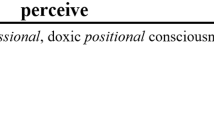Abstract
According to the epistemic theory of hallucination, the fundamental psychological nature of a hallucinatory experience is constituted by its being ‘introspectively indiscriminable’, in some sense, from a veridical experience of a corresponding type. How is the notion of introspective indiscriminability to which the epistemic theory appeals best construed? Following M. G. F. Martin, the standard assumption is that the notion should be construed in terms of negative epistemics: in particular, it is assumed that the notion should be explained in terms of the impossibility that a hallucinator might possess a certain type of knowledge on a certain basis. I argue that the standard assumption is mistaken. I argue that the relevant notion of introspective indiscriminability is better construed in terms of positive epistemics: in particular, I argue that the notion is better explained by reference to the fact that it would be rational for a hallucinator positively to make a certain type of judgement, were that judgement made on a certain basis.
Similar content being viewed by others
References
Armstrong D. (1968) A materialist theory of the mind. Routledge and Kegan Paul, London
Armstrong D. (1981) The nature of mind and other essays. Cornell University Press, Ithaca
Brewer B. (2008) How to account for illusion. In: Haddock A., Macpherson F. (eds) Disjunctivism: Perception, action, knowledge. Oxford University Press, Oxford
Byrne A., Logue H. (2008) ‘Either/Or’. In: Haddock A., Macpherson F. (eds) Disjunctivism: Perception, action, knowledge. Oxford University Press, Oxford
Farkas K. (2006) Indiscriminability and the sameness of appearance. Proceedings of the Aristotelian Society 106: 205–225
Fish W. (2008) Disjunctivism, indistinguishability and the nature of hallucination. In: Haddock A., Macpherson F. (eds) Disjunctivism: Perception, action, knowledge. Oxford University Press, Oxford
Hawthorne J., Kovakovich K. (2006) Disjunctivism. Proceedings of the Aristotelian Society Supplementary 80: 145–183
Locke, J. (1975). An essay concerning human understanding (P. Nidditch, Ed.). Oxford: Oxford University Press. (Original work published 1689)
Lycan W. (1987) Consciousness. MIT Press, Cambridge
Lycan W. (1996) Consciousness and experience. MIT Press, Cambridge
Martin M. G. F. (2004) The limits of self-awareness. Philosophical Studies 120: 37–89
Martin M. G. F. (2006) On being alienated. In: Gendler T.S., Hawthorne J. (eds) Perceptual experience. Oxford University Press, Oxford
Pelling C. (2008) Exactness, inexactness, and the non-transitivity of perceptual indiscriminability. Synthese 164: 289–312
Siegel S. (2004) Indiscriminability and the phenomenal. Philosophical Studies 120: 91–112
Siegel S. (2008) The epistemic conception of hallucination. In: Haddock A., Macpherson F. (eds) Disjunctivism: Perception, action, knowledge. Oxford University Press, Oxford
Smith A.D. (2008) Disjunctivism and discriminability. In: Haddock A., Macpherson F. (eds) Disjunctivism: Perception, action, knowledge. Oxford University Press, Oxford
Soteriou M. (2005) The subjective view of experience and its objective commitments. Proceedings of the Aristotelian Society 105: 193–206
Sturgeon S. (2006) Reflective disjunctivism. Proceedings of the Aristotelian Society Supplementary 80: 185–216
Sturgeon S. (2008) Disjunctivism about perceptual experience. In: Haddock A., Macpherson F. (eds) Disjunctivism: Perception, action, knowledge. Oxford University Press, Oxford
Sutton J. (2007) Without justification. MIT Press, Cambridge
Author information
Authors and Affiliations
Corresponding author
Rights and permissions
About this article
Cite this article
Pelling, C. Characterizing hallucination epistemically. Synthese 178, 437–459 (2011). https://doi.org/10.1007/s11229-009-9651-4
Received:
Accepted:
Published:
Issue Date:
DOI: https://doi.org/10.1007/s11229-009-9651-4



